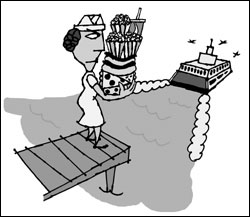COME THE FIRST of the year, the Washington State Ferries (WSF) system is poised to stop selling food and drink. The state blames its food-service workers for the shutdown, because they want to retain their jobs. The nerve.
On Monday, Dec. 8, the Marine Employees’ Commission (MEC), the state agency that oversees labor relations on the state ferries, ruled that the ferry system must require that any new cafeteria- services contractor give preference to existing unionized workers. Last spring, the present contractor, Sodexho, gave notice that it wanted out. After a series of extensions, Sodexho will stop serving at year’s end. Meanwhile, WSF’s call for proposals for a new contractor left out any requirement that the new contractor give preference to existing workers a provision that has been standard for the past 40 years. The Inlandboatmen’s Union (IBU), representing the endangered workers, filed suit.
Meanwhile, no company has bid to take over the Sodexho contract.
The conflict is all about money. The ferry system has been hit hard by budget cutsespecially Initiative 695’s reduction of the motor-vehicle excise tax, which was a major source of ferry funding. Now, ferry system CEO Mike Thorne is under pressure to cut costs and streamline services. The result has been a “5-5-5” plan to raise fares 5 percent, increase business revenue 5 percent (from such efforts as the Colman Dock development project), and save 5 percent with “efficiencies,” mostly in payroll. At the same time, Sodexho balked at the state’s 10.5 percent cut of its food-service revenuea percentage that was negotiated down to 7.5 percent for the company’s final three-month extension. As schedules have been pared, overall ridership is downadding to the ferry system’s money woes. WSF had hoped that by allowing a new contractor to save on labor costs with nonunion wages, a new deal would be more desirable for potential biddersand the state could preserve its cut of revenue.
WHAT WOULD OTHERWISE be an arcane labor squabble takes on far greater importance for two reasons. The first, of course, is that lots of people still ride the ferries. If they head upstairs in January for a warm cup of clam chowder while they stare out the window at the scenery, only to find the chowder missing, it could get ugly.
More broadly, the ferry system is far from the only state agency looking to cut budget and payroll. Government jobs are one of our state’s last remaining union strongholds. The political and economic pressure to privatize services is substantial, and labor leaders see the ferry struggle as having the potential to set a dangerous precedent.
Beneath all this lie two questionable public-policy assumptions. The first is that ferry service, an extension of the state highway system, ought to be at or close to supporting itself financially. The goal of fiscal self-sufficiency also plagues bus systems, the future light-rail and monorail projects, Amtrak, and virtually every other public transportation system in our country today. The automobile is massively underwritten by the public, from the cost of building and maintaining roads and bridges to the massive federal handouts now in style for oil companies. We don’t expect a freeway to pay for itself. Why should a ferry?
CAUGHT IN THE MIDDLE are ferry food- service workerstargets because they make a living wage (about $14 an hour) in a type of job that on land often pays half that. But the problem, in this case, isn’t that the ferry system is being forced to pay a salary its workers might be able to live onit’s that so many others are working hard in jobs that pay poorly. It’s hard enough support a family or afford basic amenities on $14 an hour (about $2,400 a month before taxes). Sit down with your budget and figure out how you’d live on that income. Then try figuring it out at minimum wage. If we can’t rely on public jobs to meet a standard of basic livability, where can we expect it?
Mike Engels, regional director for the IBU, reports that with the legal status of workers clarified, potential contractors are now talking with his union, which is “somewhat optimistic” that, after the MEC’s favorable running, the IBU will be able to work with the state and a new contractor to preserve food services and the living-wage jobs of their providers.
Let’s hope so. Our ferry system needs more moneybut it shouldn’t be creating a new outpost of the working poor in order to raise it.







